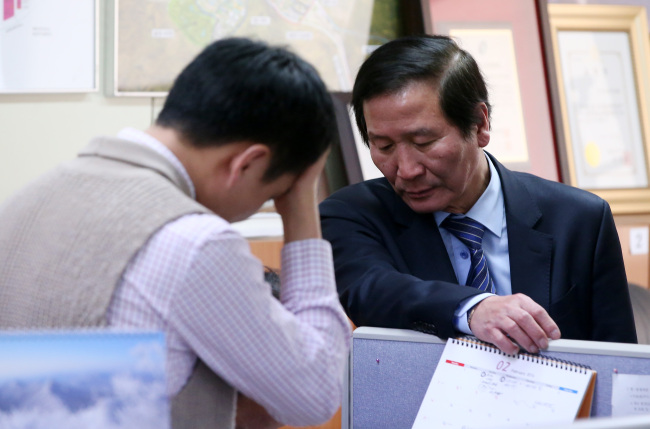One hundred-twenty four South Korean companies that have been producing garments, shoes and watches in North Korea’s border city have become casualties of the unfinished Cold War on the Korean Peninsula, as renewed tensions between the two sides led to a sudden shutdown of a factory complex.
North Korea on Thursday said that it was freezing all South Korean assets in Gaeseong Industrial Park and that its military was taking over control of the factory complex which it has been running jointly with the South since 2004. Public and private investment by South Korea into the complex so far total more than 1 trillion won ($847 billion).
North Korea on Thursday said that it was freezing all South Korean assets in Gaeseong Industrial Park and that its military was taking over control of the factory complex which it has been running jointly with the South since 2004. Public and private investment by South Korea into the complex so far total more than 1 trillion won ($847 billion).

The announcement was in response to Seoul’s decision Wednesday to close the park completely by Saturday in retaliation against Pyongyang’s recent nuclear and rocket tests.
“I am shocked and perplexed (by the sudden shutdown). We were to ship 12,000 pairs of shoes today. I don’t know what to do,” a manager of a South Korean shoe factory said at the Dorasan immigration office. From early in the morning, the immigration office, located south of the inter-Korean border, was crowded with South Korean managers like him heading to the joint industrial park to prepare for the closure.
But with no North Korean workers having showed up, there was very little the managers could do to withdraw their facilities, raw materials or products, managers who returned to the South said. Pyongyang‘s announcement of the asset freeze came later in the afternoon.
Losses from the pullout could be devastating for Gaeseong-based companies, mostly small manufacturers of labor-intensive products, said Chung Ki-sup, who chairs a council for Gaeseong-based South Korean firms.
Chung, who also runs a plant at the park, could not hide his bitter feelings towards the South Korean government.
“The government did not give us a chance to reduce losses. We were just told that the park will be closed,” he said. “It is as if we have been ordered to jump off cliffs to our deaths.”
He pointed out that the two Koreas had agreed in 2013, when they resumed operations at Gaeseong after a five-month suspension, that the complex would stay intact, regardless of any deterioration of bilateral tensions.
Envisioned and established in 2004 by the liberal South Korean administration which favored reconciliation, Gaeseong industrial complex has a history as checkered as inter-Korean ties. In 2013, factories stopped production for nearly five months due to North Korea’s blockage, but this is the first time that the South has decided to shut it down.
Announcing the shutdown on Wednesday, South Korea said that it was “an inevitable measure to make North Korea pay a price for its wrong behavior” and to prevent South Korea’s resources from being used for North Korea’s nuclear and missile programs. It is meant to punish the defiant North, which on Sunday launched a rocket that the world sees as a banned test of ballistic missile technology, following a hydrogen bomb test last month.
A total of 124 South Korean companies were operating in the complex, employing more than 54,000 North Korean workers. Since workers were paid in dollars -- about $100 million in total per year -- conservative critics had said that it serves as a major source of the greenback for the cash-strapped North.
The South Korean government on Thursday set up a task force team to support Gaeseong-based firms, while Financial Supervisory Service chief Zhin Woong-seob asked financial institutions for cooperation “to refrain from retrieving loans or raising interest rates for the firms based in Gaeseong and their subcontractors.”
South Korea has offered insurance to the companies in the event of a shutdown or war, but nearly 40 percent of them, or 48 firms, did not sign up for it.
Those who are covered are entitled to compensation of up to 90 percent of their initial investment amount, not the actual loss, with a cap at 7 billion won ($5.8 million). That money must be returned once operations resume.
In 2013, when operations were suspended for five months, South Korean employers reported a combined loss of over 1 trillion won. Fifty-nine companies received 176 billion won in total insurance compensation.
By Lee Sun-young (milaya@heraldcorp.com)












![[From the Scene] Monks, Buddhists hail return of remains of Buddhas](http://res.heraldm.com/phpwas/restmb_idxmake.php?idx=644&simg=/content/image/2024/04/19/20240419050617_0.jpg&u=20240419175937)


![[From the Scene] Monks, Buddhists hail return of remains of Buddhas](http://res.heraldm.com/phpwas/restmb_idxmake.php?idx=652&simg=/content/image/2024/04/19/20240419050617_0.jpg&u=20240419175937)

![[KH Explains] Hyundai's full hybrid edge to pay off amid slow transition to pure EVs](http://res.heraldm.com/phpwas/restmb_idxmake.php?idx=652&simg=/content/image/2024/04/18/20240418050645_0.jpg&u=20240419100350)

![[Today’s K-pop] Illit drops debut single remix](http://res.heraldm.com/phpwas/restmb_idxmake.php?idx=642&simg=/content/image/2024/04/19/20240419050612_0.jpg&u=)